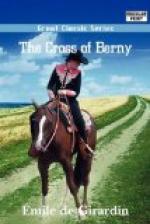“What do you want, my child?” I said, drawing her within the door.
“Nothing, madame,” she said.
“But you must have come here for something?”
“I did not know that madame was in her room.”
“What did you come to do in here?”
“I came, as I did yesterday, to see.”
“To see what?”
“In there ... the Turks ...”
“The Turks? What! am I surrounded by Turks?”
“Oh! they are not in the little room adjoining yours; but through this little room you can look into the large saloon where they all stay and have music ... will madame permit me to pass through?”
“Which way?”
“This way. There is a little door behind this toilet-table; I open it, go in, get up on the table and look at the Turks.”
The child rolled aside the toilet-table, entered the little room, and in a few minutes came running back to me and exclaimed:
“Oh! they are so beautiful! does not madame wish to see them?”
“No.”
In a short time she returned again.
“The musicians are all asleep,” she said ... “but, madame, the Turks are crazy—they don’t sleep—they don’t speak—they make horrible faces—they roll their eyes—they have such funny ways—one of them looks like my uncle when he has the fever—Oh! that one must be crazy, madame— ... look, he is going to dance! now he is going to die!”
The absurd prattle of the child finally aroused my curiosity. I went into the little room, and, mounting the table beside her, looked through a crevice in the wooden partition and clearly saw everything in the large saloon. It was hung up to a certain height with rich Turkish stuffs. The floor was covered by a superb Smyrna carpet. In one recess of the room the musicians were sleeping with their bizarre musical instruments tightly clasped in their arms. A dozen Turks, magnificently dressed, were seated on the soft carpet in Oriental fashion, that is to say, after the manner of tailors. They were supported by piles of cushions of all sizes and shapes, and seemed to be plunged in ecstatic oblivion.
One of these dreamy sons of Aurora attracted my attention by his brilliant costume and flashing arms. By the pale light of the exhausted lamps and the faint rays of dawning day, almost obscured by the heavy drapery of the windows, I could scarcely distinguish the features of this splendid Mussulman, at the same time I thought I had seen him before. I had seen but few pachas during my life, but I certainly had met this one somewhere, I looked attentively and saw that his hands were whiter than those of his compatriots—this was a suspicious fact. After closely watching this doubtful infidel, this amateur barbarian, I began to suspect civilization and Europeanism.... One of the musicians asleep near the window, turned over and his long guitar—a guzla, I think it is called—caught in the curtain and




